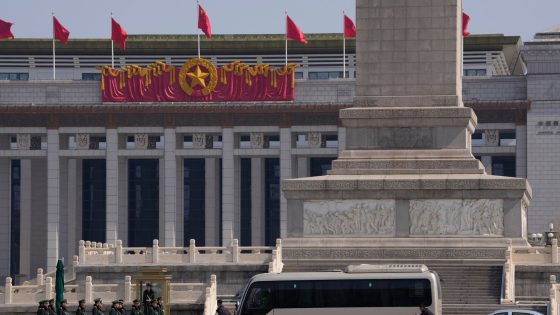VIRGINIA BEACH, Va. (WAVY) — Residents in a Virginia Beach neighborhood once had Arnold Palmer’s Signature at West Neck Golf Course. Today, they have acres and acres of weeds and heavy underbrush, so heavy that one time the abandoned course caught fire.
It closed down Sept. 29, 2019, after the original owner sunk into hard times financially and could no longer maintain the course, but now a developer wants to build a mixed-use community.
There are some bad relations out in the West Neck community, but well-known developer Harrison and Lear Inc. wants to mend fences and develop what is considered a giant eyesore into a community called Signature Meadows.
At the former course with Harrison and Lear President Jonathan Skinner, he is most proud that the project, he believes, addresses stormwater needs on the property, has land conservation elements with the planting of trees and other reforestation efforts and provides high quality single family and multi-family housing.
But not everyone is happy, and some are really teed off, especially when discussing the “Spite Wall.”
The spite wall symbolizes the bad blood at the former Signature at West Neck Golf Course.
According to neighbors, the “wall” was put up by the new golf course property owner David LaClair, who refused neighbors’ requests to cut back thick overgrowth on his property.
“I had a beautiful view just like Tom [Luckman] and I did, and now that view is gone,” Joe Kuhn said. “We complained, and he basically said,’ ‘OK I’m putting up a wall. … Now you don’t need to look at it.”
The brush was so thick it caught fire in March 2023. Ten homes were threatened, but luckily, none were damaged.
When asked about this, Skinner was quick to distance himself from the owner’s actions,
“I am distinctly separate from the property owner,” Skinner said. “I do not agree with any of the decisions they have made with maintenance or with the fence. What he did was not neighborly. My intention here is to improve the situation and bring peace and quality of life to neighbors.”
Calls to LaClair and his attorney were not returned.
Skinner’s only relation to the property owner is that he has an option to buy the property if he can get it rezoned.
Skinner has spent a year-and-a-half promoting Signature Meadows. Well-produced videos can be found online.
The project videos show focus groups, public meetings and details of the project. There would be 157 homes built on 202 acres, with an emphasis that there will be 180 acres of open space.
A Drone 10 view over the former golf course shows what has happened to what was once considered a premier local golf course, and one that was tough as nails from the tips.
“There is a vocal minority who advocate for only a golf course,” Skinner said, “but the majority of residents simply want a solution, and many appreciate the fact that we will be converting 180 acres to open space amenities that they’ll be able to enjoy.”
West Neck Community Association president Tom Luckman, who is opposed to the project, said he didn’t sense the same sentiment from neighbors.
“If that were true that he’s getting all this positive response,” Luckman said, “then he would put his application in and be up to at the Planning Commission and City Council next week.”
Both government agencies would have to hear the rezoning request, and council would have to approve it before it could be built.
Skinner has not yet filed an application for the project.
Why not?
“What we have been doing is engaging with residents to improve upon the plan to make it the best plan possible,” Skinner said. “As a matter of fact, we had planned to put in pickleball courts, but the focus groups indicated that was not something they wanted.”
Skinner admits his biggest challenge is getting community support and convincing Virginia Beach City Council to change strict density restrictions.
“That is a perspective of the analysis, but it is 202 acres,” Skinner said, “and we are proposing 157 homes, which is roughly .75 units an acre, which complies with the transitional area guidelines.”
When Luckman heard that, he immediately replied that “that is not true.”
Luckman pointed out that the golf course was part of the original deal, which allowed the community to be built in 1999.
“We were granted a variance when it was developed,” Luckman said. “They counted the golf course in that one acre. So, the 175 acres of developing a golf course has already been counted. You can’t count it again. You can’t build houses on a golf course that was deemed to be the reason the homes were allowed to build.”
Skinner, asked whether he thinks he will get the six votes needed on council to approve his project?
“I feel like we will get there,” Skinner said.
Luckman disagreed.
“Council is not going to change the rules and screw the transition area,” Luckman said. “The council won’t do that. I think council is too smart to do that.”
Told that he is asking the council to change its direction, Skinner said he was putting forth an answer to a problem.
“I am proposing a solution,” Skinner said, “and the city needs quality housing as well. In my meetings with city leadership and city staff, I have been given very positive feedback from this proposal.”
Skinner is convinced no one will ever come in with $8 million to $10 million to rebuild the golf course.
“It’s all about greed,” Luckman said. “I mean, they can make so much more money if they put something else there beside a golf course.”
Skinner was quick to disagree with that and said that “in fact, I would have been happy to broker the sale of a golf course. It would have taken a lot less work and would have been similarly rewarding.”
Skinner’s attitude in so many words: if not my plan, then what plan?
Is this the way the property remains forever?
“Skinner wants to destroy two communities,” Luckman said.
Skinner said he’s trying to make it better, and said it’s the best path forward because there won’t ever be a golf course.
“Well, that’s his opinion,” Luckman said.
Skinner and Luckman addressed what their end game was.
For Skinner?
“If this is not approved, then the situation remains as it is in perpetuity because of the cost to redevelop the golf course,” Skinner said. “If I don’t succeed, I will move on to the next opportunity trying to build a new community in another place.”
Said Luckman: “I’ll tell you the end game. The community sticks together, and this guy realizes that he’s putting a lot of time and effort into something that isn’t going to happen, and he’s smart enough to walk away.”
Skinner said residents want what they consider a public nuisance to be taken care of.
“The residents are also disappointed that the city hasn’t stepped in to solve the pubic nuisance of the golf course,” Skinner said, “that in many parts is not maintained, and they feel their city has let them down.”
Virginia Beach Director of Communications Tiffany Russell said the city was not able to get total property maintenance in that area.
“We understand that residents were hoping that mowing would be required in areas directly adjacent to their homes. Unfortunately, this outcome—total maintenance of the property—was not achievable through the negotiated settlement,” Russell said. “What may not be widely known is this: had this case been tried and the federal court found the City Code ‘active farming’ exception applicable, none of the property would have been subject to the mowing requirement. In order to avoid this significant risk, the city negotiated a settlement that requires a substantial portion of the property be maintained at or below the 10” height required by the City Code, including high visibility areas along the public rights of way. The city has committed resources to ensure WC Capital upholds its end of the agreement.”
The General Assembly is also weighing in with HB 1054, introduced by Virginia Beach Del. Barry Knight to specifically deal with the Signature at West Neck golf course “to allow a locality … to require the owner of property … to prevent the property from becoming a detriment to health, safety, or welfare.”
It allows the locality to go in, if necessary, and cut the vegetative growth and charge the property owner.
This is a specific case for the legislation, but it has been continued until next year’s General Assembly Session because the matter is tied up in federal court.
Calls to the property owner, David LaClair, and his attorney were not returned.
For the latest news, weather, sports, and streaming video, head to WAVY.com.
Source Agencies



